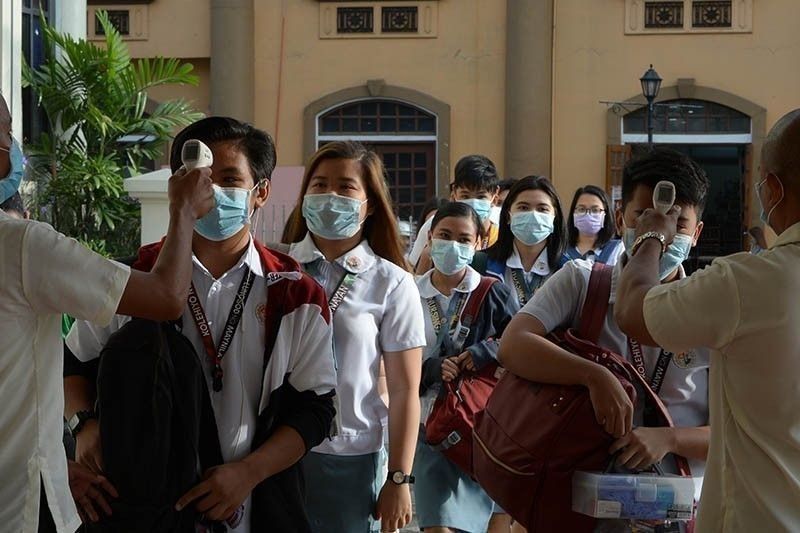IATF OKs limited face-to-face classes in universities below Alert Level 3

MANILA, Philippines — The pandemic task force has approved the Commission on Higher Education's proposal for limited in-person learning to resume in universities in areas below Alert Level 3.
Acting presidential spokesperson Karlo Nograles said Wednesday the task force had approved Resolution 148-G, which allows for the move.
Following the pronouncement, limited face-to-face classes are now allowed provided indoor venue capacity is set at 50%.
IATF said there should also be no opposition from respective local governments, and it would remain limited only to fully vaccinated teaching and support staff as well as students.
"CHED is mandated to execute the phased implementation program to ensure the safe reopening of higher education campuses," Nograles said in a statement.
Phase 1 of the implementation would begin on December this year, where universities in areas under Alert Level 2 could begin applying for limited physical classes.
The IATF has set the Phase 2 from January 2022 onwards, where higher educational institutions under Alert Level 3 could then start the application process.
Classes in the tertiary level had been conducted remotely since March 2020, when the coronavirus pandemic hit the Philippines.
But some programs have been allowed for a limited resumption since then, primarily on medical and health allied programs, as well as a select few requiring in-person training.
The National Capital Region is among the areas under Alert Level 2, with the Department of Health classifying it now as "low-risk" for COVID-19 after months of a Delta variant-driven surge.
Still, IATF sought to remind that the gradual return to classrooms for college students should be done with "proactive measures and restrictions" to prevent COVID-19 infections.
These, it said, include COVID-19 vaccination for eligible participants, the continuous wearing of face masks, physical distancing and hand washing.
IATF's pronouncement noticeably no longer included the wearing of face shields which had been mandatory for almost a year.
This week, the Duterte administration relaxed the long criticized policy, and said the wearing of such would be limited to areas under higher alert levels.
"As we slowly and cautiously open our college classrooms," the task force said, "we urge all stakeholders involved to work together to ensure the safety of our students so that they may be able to return to their schools secure in the knowledge that every effort has been made to safeguard their health."
Follow this thread for updates on when classes will resume, and how those classes will be conducted.
Photo: Students wearing protective face masks have their temperatures taken while entering their college campus in Manila on January 31, 2020. AFP/Ted Aljibe
DepEd says School Year 2022-2023 "shall open on Monday, August 22, 2022, and shall end on July 7, 2023. It shall consist of 203 school days or as may be determined by further issuance/s in case of changes in the school calendar due to unforeseen circumstances."
Sen. Nancy Binay calls on the Commission on Higher Education and the inter-agency task force on COVID-19 not to "burden" students over requirements for face-to-face classes.
Higher educations students are being required to present medical insurance and other documents before participating in face-to-face classes.
“This is a cumbersome and unnecessary requirement para sa college students, considering that by law, all Filipinos are automatic members of PhilHealth. Sa totoo lang, 'di kailangang dagdagan ang proseso, dapat nga mas simplehan pa,” Binay says.
The Department of Education announces that it will increase the number of participating schools in the pilot implementation of face-to-face classes.
"The expansion of the number of pilot schools will allow a greater degree of experience among all our regions that will serve us well for the expanded phase of face-to-face classes," DepEd says.
With the approval of the Office of the President, the Department of Education is announcing that it will increase the number of participating schools in the pilot implementation of face-to-face classes.
— DepEd (@DepEd_PH) November 11, 2021
Read: https://t.co/cCqC91kZPw pic.twitter.com/Us3GvFxp1F
COVID-19 immunization has started for tertiary students in Ilocos Norte as part of the massive vaccination campaign of the Commission on Higher Education.
This in preparation for the reopening of in-person tertiary classes, CHED-Regional Office 1 said as a ceremonial vaccination of students at Mariano Marcos State University was held on Monday in collaboration with the Department of Health, Department of Interior and Local Government, the provincial government and Mariano Marcos Memorial Hospital and Medical Center.
About 800 students are expected to be inoculated through the CHED immunization drive.
Prior to this, MMSU had already vaccinated 75% of its student population. — The STAR/Artemio Dumlao
President Rodrigo Duterte has authorized limited face-to-face classes for the following programs:
- Engineering and Technology programs
- Hospitality/ Hotel and Restaurant Management
- Tourism/ Travel Management
- Marine Engineering
- Marine Transportation
Commission on Higher Education Chairman Popoy De Vera, who made the announcement, said the authorization applies to "degree programs that require hands-on experience in higher education institutions under Modified General Community Quarantine."
- Latest
- Trending































